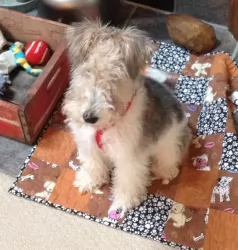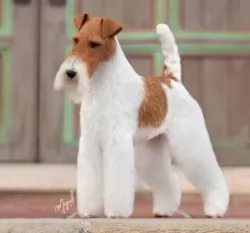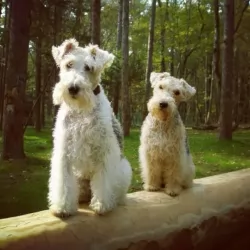 MyDogBreeds
MyDogBreeds Wire Fox Terrier is originated from United Kingdom but Labradoodle is originated from Australia. Wire Fox Terrier may grow 24 cm / 9 inches shorter than Labradoodle. Wire Fox Terrier may weigh 21 kg / 46 pounds lesser than Labradoodle. Both Wire Fox Terrier and Labradoodle has almost same life span. Wire Fox Terrier may have less litter size than Labradoodle. Both Wire Fox Terrier and Labradoodle requires Moderate maintenance.
Wire Fox Terrier is originated from United Kingdom but Labradoodle is originated from Australia. Wire Fox Terrier may grow 24 cm / 9 inches shorter than Labradoodle. Wire Fox Terrier may weigh 21 kg / 46 pounds lesser than Labradoodle. Both Wire Fox Terrier and Labradoodle has almost same life span. Wire Fox Terrier may have less litter size than Labradoodle. Both Wire Fox Terrier and Labradoodle requires Moderate maintenance.
 The wire fox terrier was developed in England by fox hunting enthusiasts. They wanted a feisty dog that could chase foxes down their burrows.
The wire fox terrier was developed in England by fox hunting enthusiasts. They wanted a feisty dog that could chase foxes down their burrows.
It is thought that the dog descended from the rough-coated black and tan working terriers of Wales.
The dog wasn’t popular as a pet until the 1930s when its appearance in certain films gave it a popularity-boost.
 The Labradoodle is certainly a popular cross breed dog which was developed originally in Australia to be a hypoallergenic guide dog.
The Labradoodle is certainly a popular cross breed dog which was developed originally in Australia to be a hypoallergenic guide dog.
The dog is a cross between a Labrador and a Poodle, possessing some of the excellent characteristics from each dog while also being a low shedding dog.
The Labradoodle became known in 1988 when an Australian breeder, crossed the Labrador Retriever and Standard Poodle. The success of the dog led other breeders to begin breeding with Labradors and Poodles, with breeders wanting to move the dog from hybrid to official breed status. As of today, the Labradoodle isn’t recognized as a breed by the American Kennel Club.
 The Wire Fox Terrier is a sturdy, medium-sized dog that weighs between 7 and 9kg and stands between 35 and 39cm at the withers.
The Wire Fox Terrier is a sturdy, medium-sized dog that weighs between 7 and 9kg and stands between 35 and 39cm at the withers.
The dog’s double coat is essentially white with brown or tan markings and can be medium length and wiry, tending to be curly too.
He is a light shedder. The face is long, without much shape and eyes appear to be fairly close together. The ears are fairly small and they fold forward toward the cheeks. The tail is docked and is held high.
This really is an intelligent dog and can’t tolerate being bored. It’s essentially a companion dog too and doesn't want to be separated from his owners for too long.
As a companion dog he is going to want a lot of attention. They’re independent and strong-willed and will benefit from training and socialization.
They are great around children but they do need to be supervised as they are inclined to nip, especially when highly excited. They also bark quite a bit and the owner might have to do something to stop this yapping, especially when the dog is bored.
 The Labradoodle can come in different sizes – miniature, medium and standard. The standard Labradoodle is a large dog which stands at 53 to 63cm and weighs 23 to 30kg.
The Labradoodle can come in different sizes – miniature, medium and standard. The standard Labradoodle is a large dog which stands at 53 to 63cm and weighs 23 to 30kg.
The coat also differs and it can be made up of tight curls or it can be thick and wavy or even straight. The coat is of medium length and is available in lots of colors – cream, apricot, black, whitish, brown and even a brindle color.
Strong and muscular, he has floppy ears and the tail which was once docked, is left long these days and hangs down or it can be carried somewhat upright and curved.
Known as a designer breed, your Labradoodle is sure to be nothing but a pleasure for you, being a 100% companion dog.
Because he comes from two popular dog breeds of which each possess some exceptional characteristics, your Labradoodle could inherit any or all of the characteristics from one or both dogs. He has also been bred to be a hypoallergenic dog which means you aren’t going to have to worry about too much hair flying around. But there again, if he has inherited more of the Labrador’s coat then there will be some shedding.
Because of his amicable nature, he makes a good first-choice dog for first-time dog owners too. The friendly nature of the dog doesn’t make him a particularly good watch dog however.
These are dogs which are happiest when they’re with their human family. They’re a dog breed which is also easy to train because he is intelligent and an eager-to-please dog. He gets on well with children in the home as well as with other pets.
He is the kind of dog that is willing to blend into your lifestyle. If you’re quietly reading indoors he will be lying with you and if you’re pursuing some outdoor activity, he’ll be happy to join right in with you.
The beauty about the Labradoodle is that he can adapt to any kind of lifestyle in the city or countryside, but he wouldn’t be recommended for a place with hardly any garden.He is the kind of dog who will certainly need to be exercised and he will want to join you in your outdoor activities.
It is important to remember that the way your Labradoodle turns out will be affected by socialization and training, his genes and your home and lifestyle.
 The Wire Fox Terrier is such a canine friend, ready to be with you no matter what you’re doing. They are social dogs and love being involved with their human companions.
The Wire Fox Terrier is such a canine friend, ready to be with you no matter what you’re doing. They are social dogs and love being involved with their human companions.
He is independent but still social and enthusiastic and you can describe him as the ideal family dog.
He is a bundle of energy, and when you bring him into your home, you’re going to get a family member who is playful, joyful, loving and loyal – your very best friend.
 Maybe it’s the diversity of Labradoodles that makes them so popular – as you never know quite what you’re going to get.
Maybe it’s the diversity of Labradoodles that makes them so popular – as you never know quite what you’re going to get.
Everyone agrees however that these cross-breeds make lovable, wonderful pets - lovely to look at and with all the qualities needed to ensure he is man's best friend. They’re available in 3 sizes but each size is going to make you an incredibly amazing pet and companion.
 These are healthy dogs, and if you get your dog from a responsible breeder, he will have been checked for health conditions such as cataracts, hip dysplasia, and luxating patellas.
These are healthy dogs, and if you get your dog from a responsible breeder, he will have been checked for health conditions such as cataracts, hip dysplasia, and luxating patellas.
Cataracts are a problem with the lens of the eye. The lens focuses light and it should be crystal clear. A cataract obscures vision. Sometimes the cataract can be very small but other times it can grow to the size of the lens and then it can cause blindness.
Most times, dogs with cataracts can still see, and even though a dog may experience some confusion with a cataract, they don’t hurt the dog. They don’t go away on their own and will need to be removed surgically. If you see your dog has a cataract, consult your vet to get their opinion on the matter.
Your dog may be licking and scratching a lot and it may just be that your dog has a frustrating and irritating skin problem. This itching isn’t a disease but rather a cause of some disease.
There could be so many things that are causing your pet to scratch and it could be a skin disease, parasites or allergies. It can be terrible seeing the frustration it causes your pet and he will certainly need to see the vet.
 Labradoodles can be a little bit unpredictable when it comes to their health because they can inherit problems common to one or both parent breeds. This means you could well have to deal with hip dysplasia or one of the many eye disorders there are.
Labradoodles can be a little bit unpredictable when it comes to their health because they can inherit problems common to one or both parent breeds. This means you could well have to deal with hip dysplasia or one of the many eye disorders there are.
These dogs could well be susceptible to an eye disease known as progressive retinal atrophy which is an inherited disease which can result in blindness.
Because they have floppy ears, the inside of the ear can accumulate dirt, wax and moisture, and this combination can lead to bacteria within the ear and to an infection if nothing is done to clean the inside of the ear. There are products available which can help you to gently clean the ears.
Addison's Disease is a disease found in Poodles and Labradors.It is where the pituitary gland doesn’t create the hormone ACTH. This hormone regulates cortisol and without cortisol, your Labradoodle can’t digest food properly.
Dogs with Addison's disease are usually lethargic, thirsty, they urinate often and they have an abnormally fast heart rate.
 This dog will need to be brushed regularly. Some people hand-strip their dogs. Most people prefer just to take their pets to a professional groomer to have them professionally clipped. The groomers will simultaneously clip his nails, clean the inside of his ears and also clean his teeth.
This dog will need to be brushed regularly. Some people hand-strip their dogs. Most people prefer just to take their pets to a professional groomer to have them professionally clipped. The groomers will simultaneously clip his nails, clean the inside of his ears and also clean his teeth.
The Wire Fox Terrier will expect you to supply him with high-quality dog food if you opt to use commercially manufactured dog food. These foods can be wonderfully convenient but you want the food to be packed with natural ingredients and be high in vitamins and minerals.
Any diet should also be appropriate to the dog’s age, his size, and his activity levels. Some homemade foods can also be a treat but this needs to be simple with no heavy spicing. Things such as boiled chicken, brown rice and vegetables can be an excellent choice.
 Grooming your Labradoodle will be necessary if you want the coat to look bright, vibrant and healthy. Not all Labradoodles will have the same coats, so grooming requirements might be different from dog to dog.
Grooming your Labradoodle will be necessary if you want the coat to look bright, vibrant and healthy. Not all Labradoodles will have the same coats, so grooming requirements might be different from dog to dog.
As with any dog, he will also need a brush-down twice a week. Also your Labradoodle might require trimming or clipping which will help you to maintain the coat in an easier fashion.
Make sure to ensure a top quality diet suited to his size, age and energy levels. Check him over regularly for illnesses and make sure you provide him with lots of love and attention.